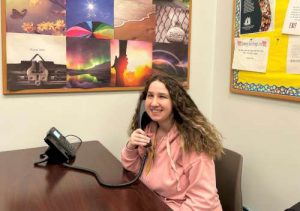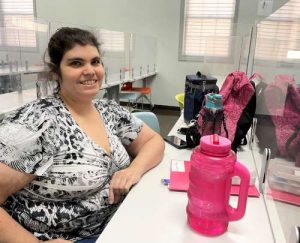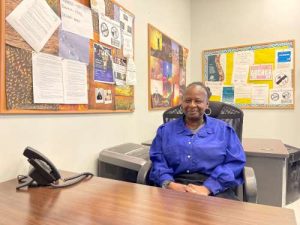
Dianna Simms at work in the CAU chat center.
Whether she’s at work, studying, or using her computer, Dianna Simms is like every other millennial who expects to get things done as efficiently as possible. She isn’t afraid to ask for exactly what she needs as a visually impaired person- but that doesn’t mean accomplishing tasks is easy.
The anniversary of the Americans with Disabilities Act is July 26th; this year marks 32 years since the landmark legislation that prohibits discrimination against people with disabilities in areas including employment, transportation, public accommodations, communications and access to state and local government programs and services. Strides have been made in those 32 years to increase accessibility and equity, but many people with disabilities still face roadblocks to fully participate in society.
“It’s very difficult for people with low vision to find jobs and they should make it more accessible,” Simms said. “They should have more websites that make it more accessible. It needs to have a voice activated button. That would help a lot of people who have low vision who are trying to find jobs.”
According to a 2022 report from a web accessibility company on the top 1,000,000 home pages, 97 percent have accessibility issues that can make them difficult for people with disabilities to use and navigate.
Simms lost her job at a hearing aid company due to pandemic closures and she currently works at Community Access Unlimited, an Elizabeth-based nonprofit that supports people with disabilities and youth at risk with services and assistance with housing, life skills, employment, personal finance, relationships, civic engagement and more.
Melissa Pearl is another CAU member who is legally blind. Both Pearl and Simms have worked to continue their academics at CAU’s Academy of Continuing Education and have completed job training programs, but they have still encountered trouble finding consistent work. Frustrations can also come when they don’t have the right tools. Both shared difficulties in getting funding to buy video magnifiers, an extremely helpful tool that can cost more than $800.

Melissa Pearl prepares for her group at ACE.
“I’m interested in a job in the community,” Pearl said. “I’m certified to do office work…If I had the magnifier I could do filing, fax, and photocopy. But how can I get the job without the equipment?”
Pearl and Simms emphasized that being inclusive to people with disabilities as an employer usually means making some simple accommodations based on the needs of the person. For example, Pearl had someone assist her to sign in to work on paper, while Simms had a magnifier at her work station and was permitted to start cleaning up a few minutes early. Taking a few extra minutes to make sure an employee with a developmental disability understands a task or process can go a long way. Some employees with disabilities have job coaches who provide one-on-one training.
“They need to be more understanding and more caring about the visually impaired and the blind,” Simms said. “People need to listen to what we have to say and not jump to conclusions.”
The ADA makes it unlawful to refuse to hire a qualified applicant with a disability because they are disabled or because a reasonable accommodation is required to make it possible for the person to perform essential job functions.
“A lot of people who don’t have visual impairment are not aware of the ADA and I would say those who don’t know should do research on it; they can watch a video,” Simms said.
The employment department at CAU connects with employers and provides services to members with disabilities to find the right job fit. Services include job coaching and supported employment, prevocational training, career planning, and an internship program.

Annie Sims at work in the CAU chat center.
Annie Sims is an Elizabeth resident who uses a cane and sometimes a walker to get around; she said she has experienced discrimination at work when she cleaned at a hotel in the 80’s.
“People were making fun of me, saying how slow I was, using the ‘r’ word,” she said.
After joining CAU advocacy efforts in the 80’s, Sims found a passion for speaking up for her own rights and advocating for others with disabilities. When she experienced delays taking Access Link paratransit, for example, she spoke at a recent public transportation hearing.
“My goal is to teach other people not to be afraid,” Sims said. “Speak up for yourself, you are who you are…pick yourself up.”
Sims is a member of the New American Movement for People with Disabilities (NAM), which works to advance progressive public policies in support of people with disabilities and others. Community members are invited to join NAM and get involved by emailing Charlotte Glover at cglover@caunj.org.
